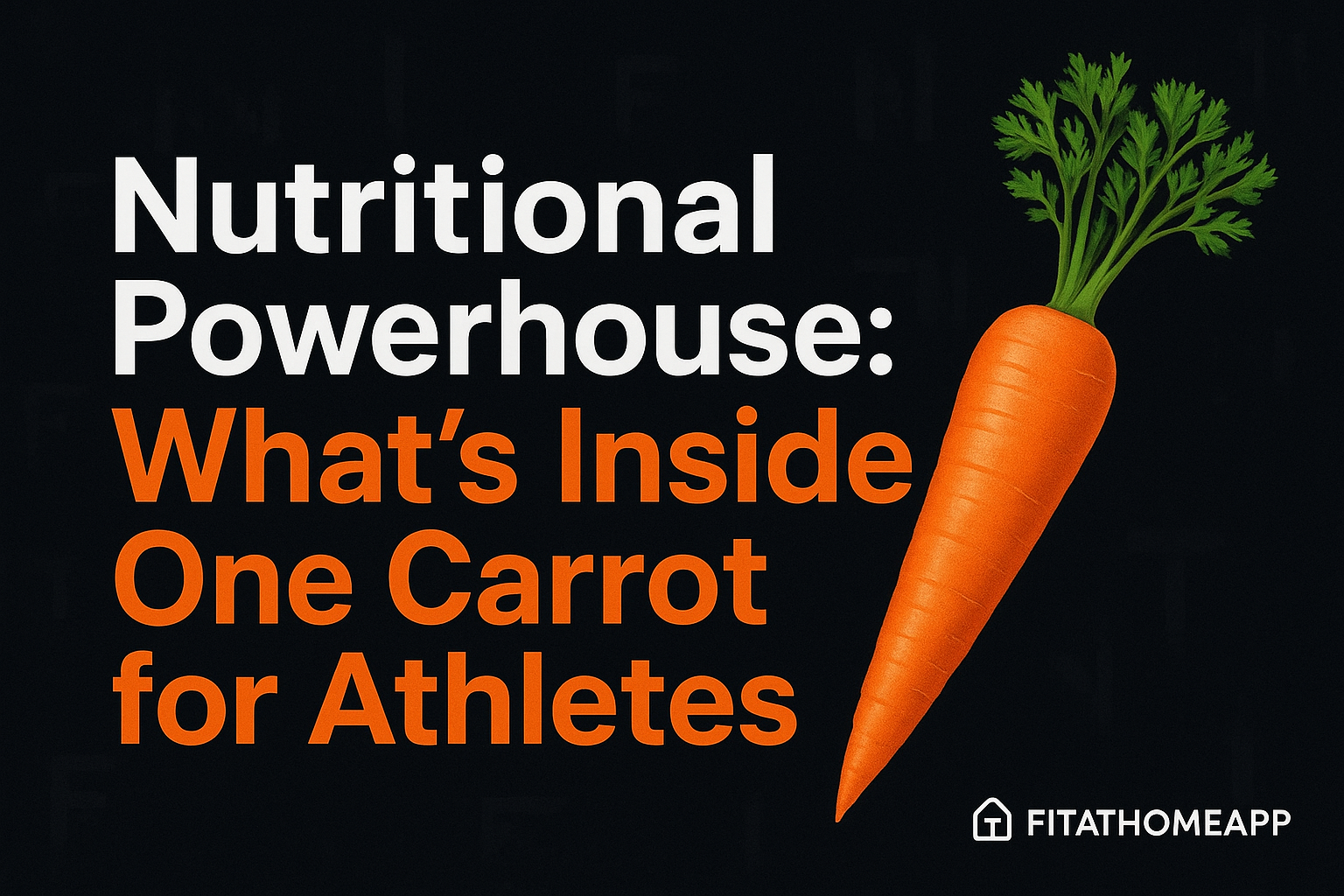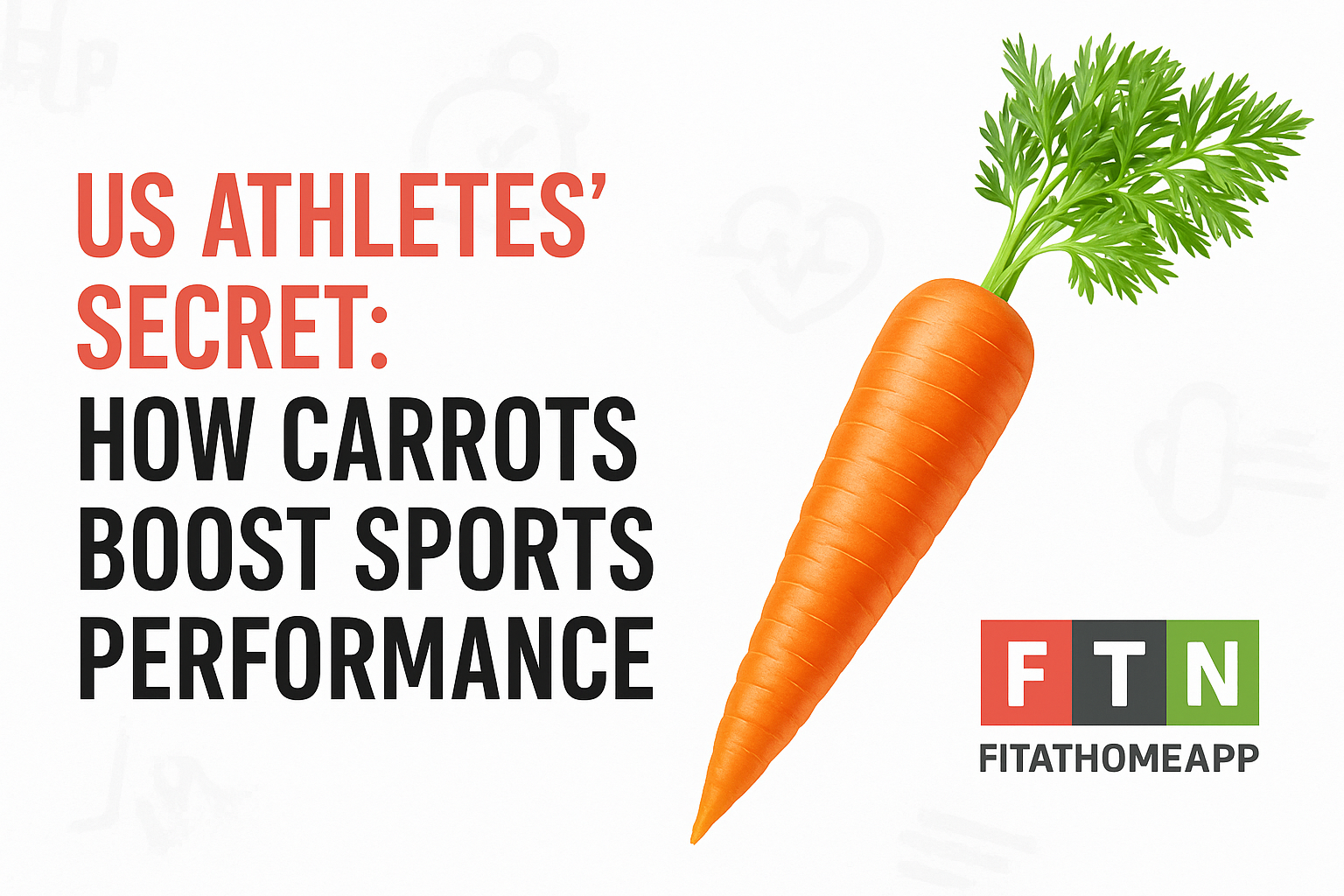🥕 Introduction to Carrots & Athletic Performance
Nutrition is the true MVP when it comes to enhancing sports performance—shaping not only physical capabilities but also recovery💡. While athletes often focus on protein, carbs, and healthy fats, vibrant whole foods like carrots deserve a starring role on the plate.
Carrots for athletes offer a powerful mix of vitamin A, antioxidants like beta-carotene, and essential fiber—supporting everything from eye health and immune function to stamina and recovery. Whether juiced, roasted, or eaten raw, carrots provide both versatility and nutrition, making them a valuable ally for athletes.
From ancient civilizations that revered them for stamina to modern sports science, carrots continue to rise in prominence as a natural performance booster. In this article, we explore how this humble veggie can power endurance, vision, recovery, and overall well-being.

🧠 Nutritional Powerhouse: What’s Inside One Carrots for athletes?
- Vitamin A (from beta‑carotene): Boosts vision—especially helpful in low-light training—and strengthens the immune system.
- Vitamin C & K: Reduce inflammation, support collagen formation, and contribute to bone health.
- Fiber (around 2 g per medium carrot): Aids digestion, keeps energy stable, and helps with weight management.
- Hydration (≈ 85 % water): Helps athletes stay hydrated during intense workouts.
- Potassium & Antioxidants: Aid muscle function and protect against oxidative stress.
Packed with nutrients, low in calories—carrots are a winning choice for athletes looking to stay fit and fueled.
🧬 The Science: Carrots & Athletic Performance
- 🏃 Increased Endurance:
Beta‑carotene acts as an antioxidant, reducing oxidative stress during intense exercise. Some studies report longer endurance in athletes who added carrots to their diet. - ⏱️ Faster Recovery:
Anti-inflammatory nutrients in carrots—carotenoids and polyphenols—help reduce muscle soreness and speed up recovery, keeping athletes ready for their next session. - 👁️ Enhanced Vision:
Vitamin A supports rhodopsin production in the eyes, which helps with color and low-light vision—an advantage in many sports situations.
👁️ Carrots & Vision: Your Athletic Edge
Clear vision is essential—whether you’re tracking a fast-moving ball or reacting to split-second plays. Athletes with strong visual acuity make quicker, smarter decisions.
For example:
- A basketball player reads the court better, sees open teammates more clearly.
- A soccer player tracks the ball near dusk with more confidence.
Elite athletes like quarterbacks and tennis pros often credit sharp vision to diets rich in colorful produce. Carrots, with their natural vitamin A, can support that edge.
🥕 How to Add Carrots to Your Diet
Carrots are ultra-versatile and easy to include:
- Raw Carrot Sticks with hummus or guac—great for snacking.
- Steamed/Roasted Carrots with herbs—add them to meals to keep nutrients intact.
- Carrot Juice Smoothie: Mix with beets or orange juice for a nutrient-packed drink.
- Carrot Salad or Slaw: Toss with greens, nuts, and light vinaigrette.
- Cooked Soups & Stews: Let carrots simmer with other veggies for flavor and health.
🌟 Tip: Add a drizzle of olive oil or some nuts to improve absorption of fat-soluble vitamins like A and K.
🔋 Carrots as a Post‑Workout Recovery Food
After training, your body craves nutrients for healing and fuelling up. Here’s how carrots help:
- Replenish Glycogen: Natural sugars provide quick energy post-workout.
- Fight Oxidative Stress: Beta‑carotene and vitamin C help muscle repair and reduce inflammation.
- Collagen Support: Vitamin C aids recovery of muscles and connective tissues.
Recovery Recipe:
Blend 1 large carrot, ½ banana, a small handful of spinach, and water for a revitalizing post-session smoothie.
⚠️ Allergies & Cautions
- Rare Allergies: May include mouth swelling or itching—especially in those allergic to birch pollen.
- Digestive Upset: High fiber may cause bloating in some; start with smaller portions.
- Cross-Reactivity: If you’re allergic to other Allium or pollen allergens, consult a doctor.
Luckily, alternatives like sweet potatoes, butternut squash, bell peppers, and peas offer similar benefits if carrots aren’t suitable.
🍽️ Athlete‑Friendly Carrot Recipes
- Carrot & Ginger Pre-Workout Smoothie
- 2 carrots, 1″ fresh ginger, 1 banana, 1 cup almond milk → energizing with anti-inflammatory perks.
- Quinoa & Carrot Power Salad
- Cooked quinoa, shredded carrots, cucumber, tomato, olive oil, lemon juice → a nutrient-rich lunch.
- Roasted Carrot Fries
- Carrot sticks + olive oil + smoked paprika @ 400°F for 25 mins → a healthy, satisfying snack.
- Carrot & Hummus Snack Plate
- Fresh carrot sticks + hummus → fiber, protein, and sustained energy.
✅ Final Thoughts: Why Carrots Matter for Athletes
Carrots may seem simple, but they pack a serious punch for performance-minded individuals:
- Enhance vision and reaction times
- Boost endurance and stamina
- Speed up recovery with antioxidants and nutrients
- Offer hydration, natural sugars, and fiber
- Are versatile, convenient, and delicious
So next time you’re prepping meals or snacks, think orange! 🥕 Carrots carry that bright power to help athletes perform stronger, recover faster, and fuel smartly.
🚀 Ready to take your workout nutrition to the next level? Start with the humble—but mighty—carrot!
Personal Take on the Video
This video “Increase Endurance/ Stamina – Juicing Raw Vegetables (Carrot, Celery, Beet Juice)” expertly highlights how carrot juice—alongside other root vegetables—serves as a natural, nutrient-rich fuel for athletic performance. It underscores the energizing benefits of beta‑carotene and antioxidants
🥕🟠 Scientific Comparison: Carrots vs Oranges
Which Is Better for Athletic Performance?
Both carrots and oranges are nutrient-dense and offer unique benefits for athletes. Here’s a detailed comparison highlighting their similarities, differences, and how each supports sports performance.
✅ 1. Nutritional Breakdown (Per 100g)
| Nutrient | 🥕 Carrot | 🍊 Orange |
|---|---|---|
| Calories | 41 kcal | 47 kcal |
| Water Content | ~88% | ~87% |
| Vitamin A | 835 µg (excellent source) | 11 µg (very low) |
| Vitamin C | 7 mg | 53 mg (excellent source) |
| Fiber | 2.8 g | 2.4 g |
| Natural Sugars | 4.7 g | 9 g |
| Potassium | 320 mg | 181 mg |
✅ 2. Health Benefits for Athletes
| Benefit | 🥕 Carrot | 🍊 Orange |
|---|---|---|
| 👁️ Vision Support | Rich in vitamin A (night vision) | Minimal vitamin A |
| 🦠 Immune Boost | Beta-carotene + antioxidants | High in vitamin C |
| 💪 Muscle Recovery | Anti-inflammatory carotenoids | Vitamin C combats soreness |
| 💧 Hydration | High water + electrolytes | High water + enhances iron absorption |
| 🧠 Antioxidant Power | Beta-carotene, polyphenols | Flavonoids, vitamin C |
🔬 3. Similarities
- Both are rich in antioxidants.
- Provide dietary fiber for digestive health.
- Hydrating and low in calories.
- Easy to include in pre- or post-workout meals.
- Natural and convenient whole foods.
⚖️ 4. Key Differences
| Factor | Edge |
|---|---|
| 👁️ Eye Health | Carrot (vitamin A boost) |
| 🦠 Immune Support | Orange (vitamin C-rich) |
| 🍬 Lower Sugar | Carrot (half the sugar) |
| 🍹 Best for Juicing | Orange (sweet and tangy) |
| 🧪 Anti-inflammatory | Both are strong, but carrot has more carotenoids |
🧬 5. Who Should Choose What?
- Athletes needing vision, endurance, and inflammation support → Go for carrots.
- Athletes prone to colds or needing rapid immune support → Choose oranges.
- For a lower-sugar, filling snack → Carrots are ideal.
✅ Final Verdict
| 🏆 Best Overall? |
|---|
| There’s no single winner. Carrots and oranges complement each other perfectly. Including both in your daily diet gives you the best of both worlds—vision, immunity, hydration, antioxidants, and recovery support. |


[…] Carrot if you want to:✅ Support vision and immune health✅ Reduce blood sugar naturally✅ Snack […]